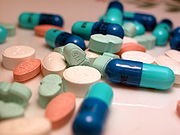
The U.S. Food and Drug Administration is strengthening the safety information on labels for over-the-counter pain relievers such as ibuprofen and naproxen. These are drugs that are known as nonsteroidal anti-inflammatory drugs or NSAIDs. The new labels will indicate that NSAIDs can increase the chance of a heart attack or stroke.
The new warning requirements do not apply to aspirin, which is an NSAID, but which does not increase the risk of heart attack or stroke. Acetaminophen (Tylenol), another common pain reliever, is not an NSAID.
Currently, labels on products containing ibuprofen (Advil or Motrin) or Aleve say that they "may cause" an increased risk of heart attack and stroke. But the FDA says that new data has provided stronger evidence of an increases risk of heart failure. The new labels will use the phrase can "cause an increased risk" for serious heart failure. This increased risk of heart attack or stroke can occur within the first few weeks of using an NSAID and may increase further with long term use of these drugs.
NSAIDs are usually used for temporary relief of pain from a headache, muscle pull, or menstrual cramps, and to reduce fever. However, they may also be used on a long-term basis for pain relief of conditions like arthritis.
Many over-the-counter products used to treat colds and flu contain NSAIDs. The FDA advises consumers not to use more than one product with an NSAID in it at a time. Consumers should check the list of active ingredients on all drug product labels.
NSAIDs are an important class of pain relievers. The FDA said in a statement that consumers can still take them, but that they should be aware of this risk. "As always, consumers must carefully read the Drug Facts label for all nonprescription drugs. Consumers should carefully consider whether the drug is right for them, and use the medicine only as directed. Take the lowest effective dose for the shortest amount of time possible," Karen M. Mahoney, M.D., deputy director of FDA's Division of Nonprescription Drug Products said in a statement.

